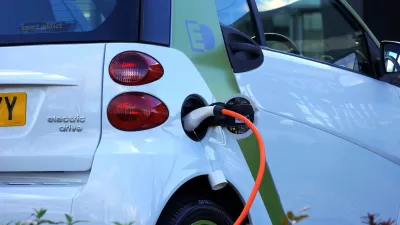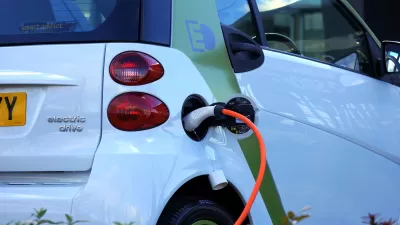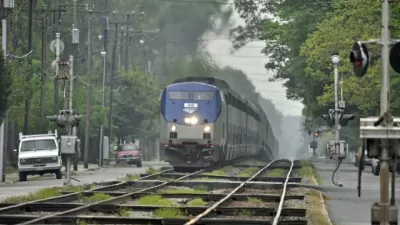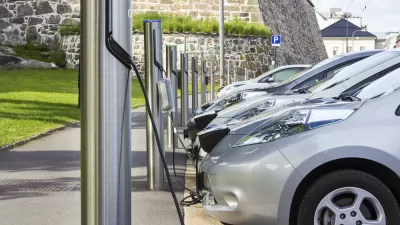The state is poised to gain nearly $1 billion from the federal plan for projects ranging from electric vehicle charging stations to bike lanes and zero-emission bus fleets.

Writing in LA Magazine, Heidi Siegmund Cuda asserts that "California, with the fifth largest economy in the world, stands to gain big—nearly $1 billion—in the current $1 trillion infrastructure plan." But "if the bill is scuttled in the Senate, California could lose about $920 million dedicated to 200 projects." These include:
a dozen bridge repair and construction projects, including a $1 million dollar pedestrian bridge in Wilmington and a bridge safety barrier rail at in Burbank at a cost of $2 million; electric vehicle charging stations for Burbank, Oakland, and San Pedro at about $2.1 million; bike lane expansions and widening in such cities as L.A., North Hollywood, Pasadena, and Camarillo for $6.6 million; and statewide wastewater and drinking water projects; as well as preparing for rising sea levels by shoring up impacted infrastructure.
In Los Angeles, the funding would go toward the Sepulveda Transit Corridor, improvements in the Vermont transit district, bike path improvements, and traffic light upgrades, among other projects. "Zero-emission bus fleets, training, and charging infrastructure are planned for Gardena, Oxnard, Pasadena, San Bernardino, and Wilmington, as part of an $18.2 million investment."
"[U]ltimately, the final bill needs the support of at least ten Senate Republicans as well as that of every Democrat to pass."
FULL STORY: If the Bipartisan Infrastructure Plan Fails, California and L.A. Lose Big

Alabama: Trump Terminates Settlements for Black Communities Harmed By Raw Sewage
Trump deemed the landmark civil rights agreement “illegal DEI and environmental justice policy.”

Planetizen Federal Action Tracker
A weekly monitor of how Trump’s orders and actions are impacting planners and planning in America.

Why Should We Subsidize Public Transportation?
Many public transit agencies face financial stress due to rising costs, declining fare revenue, and declining subsidies. Transit advocates must provide a strong business case for increasing public transit funding.

Understanding Road Diets
An explainer from Momentum highlights the advantages of reducing vehicle lanes in favor of more bike, transit, and pedestrian infrastructure.

New California Law Regulates Warehouse Pollution
A new law tightens building and emissions regulations for large distribution warehouses to mitigate air pollution and traffic in surrounding communities.

Phoenix Announces Opening Date for Light Rail Extension
The South Central extension will connect South Phoenix to downtown and other major hubs starting on June 7.
Urban Design for Planners 1: Software Tools
This six-course series explores essential urban design concepts using open source software and equips planners with the tools they need to participate fully in the urban design process.
Planning for Universal Design
Learn the tools for implementing Universal Design in planning regulations.
Caltrans
Smith Gee Studio
Institute for Housing and Urban Development Studies (IHS)
City of Grandview
Harvard GSD Executive Education
Toledo-Lucas County Plan Commissions
Salt Lake City
NYU Wagner Graduate School of Public Service





























